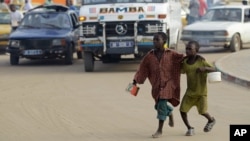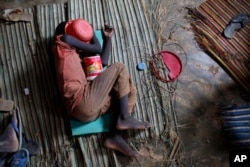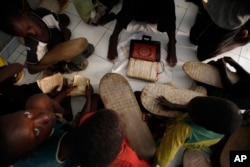Barefoot, a bucket under one arm, Senegalese child beggar Mamadou dodges cars, taxis and buses on the chaotic streets of Dakar as he searches for his parents in the hope of going home.
Mamadou is the fictional star of "Cross Dakar City," a mobile video game which aims to raise awareness of the plight of tens of thousands of children in Senegal who are exploited and forced to beg in the streets by teachers at Koranic schools.
Some parents in Senegal and neighboring countries who lack the money to bring up their children, send them to Islamic schools, or daaras, in Dakar — expecting them to receive food, shelter and teachings from the Koran.
But rights groups say the children, known as talibe, are largely exploited by abusive teachers as a way to make money.
"I wanted to highlight the dangers facing the talibe — they face beatings, kidnappings and sexual abuse," the game's creator, Ousseynou Khadim Bèye, told the Thomson Reuters Foundation ahead of International Day for Street Children on April 12.
"They also live in terrible conditions, lack access to electricity or water, and have very little food," said Bèye, 32, who studied software engineering in Dakar and created the game in his spare time from his job for an energy firm in Paris.
The game, modeled on the 1980s traffic-dodging arcade hit “Frogger,” sees players guide Mamadou across Dakar's streets while avoiding getting struck by yellow taxis, horse-drawn carts and car rapides — Senegal's iconic colorful mini-buses.
"Cross Dakar City" has been downloaded 50,000 times by mobile users since it was released in May 2015, and Bèye hopes it will foster fresh debate among politicians and the public.
More than 50,000 children are estimated to be in abusive daaras in Senegal, and face punishments such as beatings with whips, wood and rope if they fail to bring in 2,000 CFA francs ($3) per day, according to Human Rights Watch.
Senegal passed a law in 2005 aimed at stopping the abuse of the talibe, but only a dozen teachers have since been prosecuted.
"For as long as I can recall, these kids have been on the streets. Governments come and go, but the problem still exists," said Bèye, who plans to make a 3-D version of the game and create other mobile games about cultural and social issues in Africa.







